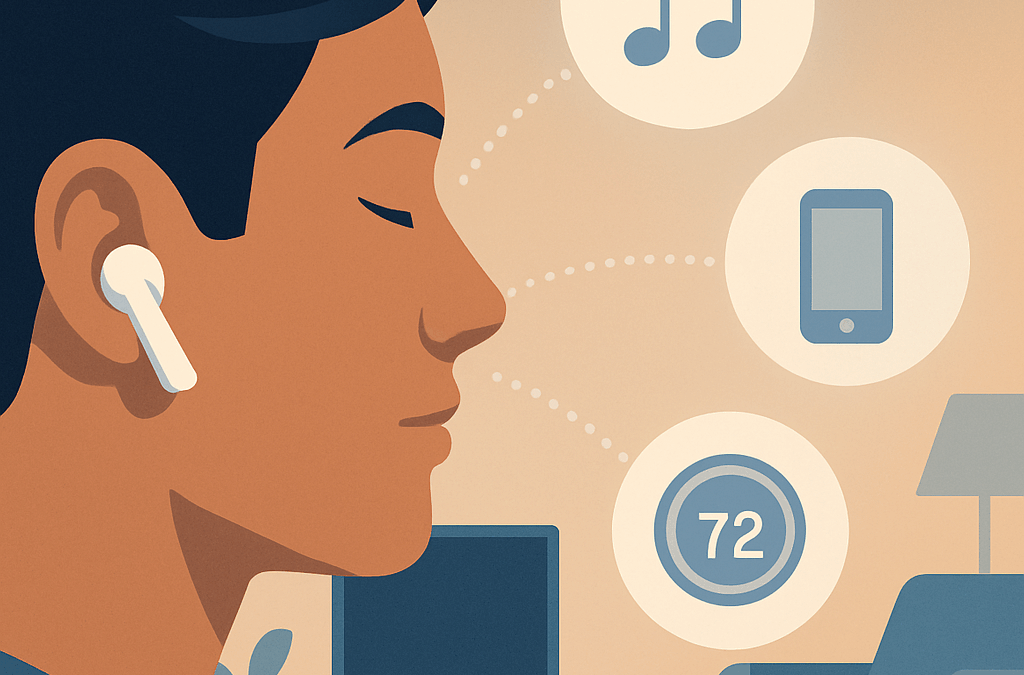Technology: “The Best Tech is Invisible”
Build or use tools that simplify, not complicate, the user experience.
🧩 What This Means:
The most powerful technologies are the ones you don’t even notice. They just work. They feel natural. They fade into the background and enhance your life or workflow without friction or noise. Think of how electricity powers your home — essential, omnipresent, but mostly unseen. That’s how good tech should behave.
Great tech doesn’t demand your attention. It amplifies your actions.
🔍 Problems with Most Tech Today:
-
❌ Overwhelming interfaces
-
❌ Feature bloat
-
❌ Constant notifications
-
❌ Clunky onboarding
-
❌ Steep learning curves
-
❌ Attention hijacking (scroll traps, gamification, FOMO)
The result? Tech becomes a burden instead of a boon.
✅ Principles of Invisible Tech
-
Frictionless:
-
Requires little to no instruction.
-
Minimal clicks, taps, or toggles.
-
Example: Apple’s Face ID — it unlocks as you lift the phone.
-
-
Predictive, Not Reactive:
-
Anticipates your needs before you ask.
-
Example: Google Maps suggesting routes based on calendar events.
-
-
Context-Aware:
-
Understands your environment, habits, preferences.
-
Example: Smart thermostats like Nest adjusting automatically.
-
-
Low Cognitive Load:
-
Doesn’t require constant decisions or input.
-
Example: Calendly scheduling eliminates back-and-forth.
-
-
Non-Interruptive:
-
Tech that serves, not steals, your attention.
-
Example: E-ink displays for focused reading without distractions.
-
🛠️ Use These Tools That Embody “Invisible Tech”
| Tool | Why It’s Invisible |
|---|---|
| Apple Shortcuts | Automates daily tasks without you thinking |
| IFTTT / Zapier | Automate cross-platform workflows |
| Notion AI | Writes, organizes, and summarizes behind the scenes |
| CleanShot X | Simplifies screenshots, screen recording with zero clutter |
| Superhuman | Turns email into a frictionless, keyboard-driven experience |
| Whisper by OpenAI | Transcribes speech without effort or delay |
🧠 Pro Tip: The “Grandma Test”
If your product can’t be picked up and used immediately by someone with zero background, it’s not truly simple.
🎯 How to Build Tech That Disappears
-
Start with empathy: What does the user want to do? Remove everything else.
-
Default to silence: Don’t push notifications unless absolutely essential.
-
Simplify flows: Kill extra clicks. Guide with clarity.
-
Design for “invisible moments”: Auto-save, sync, pre-fill, suggest — before the user even asks.
-
Test in the wild: Observe how people really interact with your tool. The friction lives in the unspoken moments.
🌍 Examples of “Invisible” Tech in the Real World
-
Uber: You push a button. A car shows up. Payment is silent. No cash, no steps.
-
Spotify’s AI DJ: Plays music you didn’t know you needed, with minimal input.
-
AirPods switching devices automatically: One tap and it’s done — like magic.
Invisible Tech, Powered by AI: The Quiet Revolution
In a world overflowing with noise and complexity, the most transformative technologies aren’t the ones shouting for attention — they’re the ones silently solving problems. And increasingly, it’s AI that’s powering these seamless, “invisible” experiences.
“The best technology doesn’t get in your way. It gets out of your way.”
🤖 AI: The Engine Behind the Curtain
Artificial intelligence is quietly reshaping every industry, not by replacing people (as many fear), but by augmenting their abilities — often without them even realizing it. AI has become the digital assistant that fades into the background, delivering value with minimal interface or input.
Here’s how AI is making tech disappear:
🧩 1. Intelligent Automation
AI tools handle repetitive tasks silently:
-
📥 Email filters (Gmail’s AI prioritization)
-
📅 Smart scheduling (Reclaim.ai, Motion)
-
🛒 Shopping suggestions (Amazon, Instacart, Shopify AI)
-
📝 AI copywriting (Jasper, Notion AI, Copy.ai)
These systems don’t require you to do more — they just do it for you.
🔍 2. Hyper-Personalization
Invisible tech is tailored to your habits, routines, and context:
-
Spotify suggests music you love before you ask
-
Netflix curates shows based on subtle viewing signals
-
Google Maps recommends the best route without prompting
All of this is driven by machine learning models trained on your behavior.
🗣️ 3. Natural Language Interfaces
Chat-based AI is eliminating clunky dashboards:
-
Tools like ChatGPT or Claude allow users to interact with complex systems in plain English.
-
No coding, no menus — just a conversation.
Prompt + AI = Superpower
You can draft legal contracts, analyze datasets, write business plans, and get coaching — all via one line of text.
🧠 4. AI That Anticipates Needs
The shift is moving from “you ask, it answers” → to “it anticipates, then delivers.”
-
Rewind.ai records everything on your device and retrieves anything you forgot
-
Rabbit R1 and Humane AI Pin are attempting to act as wearable AI butlers
-
AI in CRMs reminds you to follow up before you realize you forgot
🏠 5. Ambient Computing at Home
AI-driven smart homes now function without needing input:
-
Thermostats adjust based on your behavior and weather forecasts
-
Lights respond to presence and time of day
-
Fridges order groceries, sometimes before you realize you’re out
It’s not about tech you see — it’s about tech that sees you (respecting privacy, of course).
📉 When AI Fails the Invisible Test
Bad AI makes itself too visible:
-
❌ Constant interruptions or notifications
-
❌ “Help” features that require learning a manual
-
❌ Overly aggressive personalization that feels creepy or off-base
Remember: the best AI quietly enhances your life, not overwhelms it.
🧭 Where It’s Heading
✨ “Invisible AI” will evolve into:
-
Co-pilots for life (suggesting health, finance, relationship nudges)
-
Silent collaborators (who summarize, suggest, and correct behind the scenes)
-
Ambient intelligence (where everything you use adapts in real time without being asked)
🧠 Final Thoughts:
“We don’t want AI to feel like tech. We want it to feel like intuition.”
The future belongs to tech that feels like an extension of yourself — not a machine you have to wrestle with.
Invisible tech is not about removing humanity — it’s about removing the barriers between you and your best self. And AI is the silent engine making that possible.


